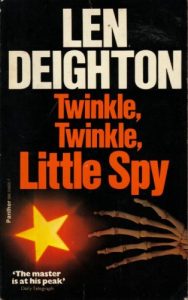
From the dry desert of the African Sahara to the wet fields of Ireland, the crisp winters of New York City and Washington D.C. to the humidity of Miami, Len Deighton’s Twinkle, Twinkle, Little Spy is a global jaunt following the implications and repercussions of a defected Russian scientist named Bekuv, his wife, Major Mann, Red Bancroft, and our lead Frederick L. Antony.
This particular spy novel has everything; a honeypot trap, corrupt politicians, murder, misdirection, masers, and of course travel.
Our leads mainly being Major Mann and Antony, our point of view, are constantly moving, racking up the frequent flier miles as they traverse a good portion of the globe working with Bekuv, the defected scientist.
And for the first time in the chronological bibliography of Len Deighton, our lead gets to have what for a spy would be considered a real long-term relationship, despite its short nature.
Sure there have been other romances and trysts, but this one has more depth than the rest. The relationship, while it exists, between our lead and Red Bancroft gives Deighton a chance to use some lines that I’m certain he was saving.
Something like “It was a strange, uncertain smile that sometimes mocked and sometimes chided but was none the less beguiling for that, as I was to find to my cost.” And it’s nice to see our hero make a mistake because of love where we have “I should have obeyed orders. I didn’t, and what happened subsequently was all my fault. I don’t mean that I could have influenced events, it was far too late for that, but I could have protected myself from the horror of it. Or I could have let Mann protect me, as he was already trying to do.”
But Deighton also stretches into two other brilliantly written messages about gender differences, the two which seem to be of most intrigue are “…and I saw Red and Mrs Mann exchange that sort of knowing look with which women greet the downfall of a male.” and ‘Perhaps it’s one of those happy marriages you never read about.’
But that’s about as close to romance as it gets outside of the interpersonal interplay of the characters. And moving on to the makeup of the book, it’s very similar in a wonderful way to everything else Deighton has done.
There are the jabs at organizations such as the P.A.D. “The Psychological Advisory Directorate was a cosy assembly of unemployed head-shrinkers who knew how to avoid every mistake that the C.I.A. ever made, but unfortunately, didn’t tell anyone until afterwards.”
There’s a thought process conversation, ‘There comes a time in your life when you have to do the human thing–make the decisions the computer never makes–give your last few bucks to an old pal, find a job for a guy who deserves a break, or bend the rules because you don’t like the rules.’
And there’s also conversational semantics with “supposed.” ‘Supposed to mean?’ said Mann. ‘I’m glad you said supposed to mean because there’s often a world of difference between what things mean, and what they are supposed to mean…’
But the two things I found most interesting, were Deighton’s technological nostalgia and his return to the desert.
The nostalgia comes when Major Mann and our hero are in an airport where they had some time to partake in a meal that seldom exists on this earth anymore. “There was also time to feed two dollars into a jovial robot which dispensed cold cheeseburgers in warm Cellophane and hot, watery coffee in dark-brown plastic cups.”
And of his characters return to the desert, of which a few other books have jaunted off into, he captures something of the wonder of the place with “Men become mesmerized by the desert, just as others become obsessed with the sea; not because of any fondness for sand or water, but because oceans and deserts are the best places to observe the magical effect of ever-changing daylight.”
But do not mistake our hero Antony as anything other than another brilliant, quiet, and cynical hero in the vein of Palmer, Armstrong, and Charles who came before. The coarseness of the character, even when romantically involved, makes him distant and ever observing even when he isn’t being prescribed the action of doing so.
And in that Len Deighton has basically done it again. And since I too have a cynical nature, I will continue to read through the back catalog of Deighton and I will at this point look forward to relating even more to the protagonist of his next spy novel.

